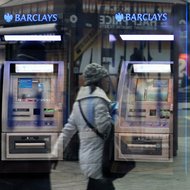 Andy Rain/European Pressphoto AgencyA branch of Barclays in London.
Andy Rain/European Pressphoto AgencyA branch of Barclays in London.
LONDON – Barclays agreed on Tuesday to buy the British savings and loan business of the Dutch firm ING Group.
The deal reflects Barclays shifting focus toward retail banking after a recent rate-manipulation scandal led to the resignation of its former chief executive, Robert E. Diamond Jr. The firm’s new chief, Antony P. Jenkins, previously ran the bank’s retail banking operations, and he has said that he will stop business activities that pose a “reputational risk” to the British bank.
Last week, Barclays announced a broad reorganization of its investment banking unit, the group at the center of the rate-rigging case. Hugh E. McGee III, one of the firm’s top deal makers, became its most senior corporate and investment banker in the Americas, while Eric Bommensath was tapped to run a combined fixed-income and equities sales and trading division.
Under the terms of the deal announced on Tuesday, the British bank will acquire deposits of £10.9 billion ($17.5 billion) and mortgages worth a combined £5.6 billion from ING Direct U.K. The acquisition also will add 1.5 million customers to its existing 15 million client base, according to a Barclays statement.
The British bank will acquire ING Direct U.K.’s mortgage book at a 3 percent discount, while the deposits will be acquired at par value, the firms said in separate statements.
“The acquisition of ING Direct U.K. is a good fit with Barclays’s existing U.K. retail banking business,” Ashok Vaswani, head of the British retail and business banking unit of Barclays, said in a statement.
The deal, which is expected to close in the second quarter of 2013, will result in a net loss of 260 million euros ($336 million) for ING. The Dutch bank added that the loss would be offset by 330 million euros of extra capital that would be freed up when the deal is completed.
ING has been required to dispose of assets around the world as part of a bailout from its local government during the financial crisis. Last month, ING sold its 9 percent stake in Capital One though a public offering worth around $3 billion.
Article source: http://dealbook.nytimes.com/2012/10/09/barclays-to-buy-british-retail-unit-from-ing/?partner=rss&emc=rss

